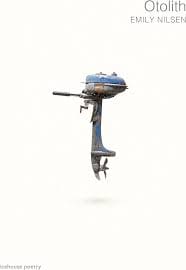REVIEW: OTOLITH | BY EMILY NILSEN
 >>From the Hamilton Review of Books, Canisia Lubrin reviews Emily Nilsen’s Otolith
>>From the Hamilton Review of Books, Canisia Lubrin reviews Emily Nilsen’s Otolith
Icehouse Poetry / Goose Lane Editions | $19.95 | 96 pages | purchase online
Otolith, Emily Nilsen’s new pastoral, wakes deep in the ear and channels the reader through the speaker’s multifarious experiences of grief, loss, the burden of memory, us — the species and the self. We find that we ourselves are called through the ecologies of our becoming and undoing, such as the speaker’s “Wakeman estuary,” places where we can moor and unmoor often with a sea of white space, needed breathing room around these heavy poems that allow shifts in tenor, perspective, lush images, that recall expectations abandoned “nearer/the river as morning mist lifts/the drowned night/onto shore.”
In the section aptly titled Intertidal, the poems rest on the bottom of the page like anchors: Nilsen is painfully aware of the certitudes that demarcate in the world, the sites of our belonging, and we get the sense that she wants us to, like she has with her Solie-esque sway between human and landscape — trouble these. From “the city [that] scrambles like crabs on a rock, blindly/tinkering ahead” to the many homes in which “we fend off scurvy and make-believe our way/out of another tragedy.” The wild in this collection feels familiar partly because of the effortless, modulated cadence of Nilsen’s lines. And perhaps, because the poet has succeeded in doing a rare thing. She has found a way, not merely to remind us of our first sea-home selves, but also to convince us of ways that we create security out of uncertainty: that part of us that scuttles at the ominous, the thing we call sorrow that roils us with concern, further still, the stubbornness of a tomorrow that somehow opens up the pretext of the collection’s metaphysical conceits with cool, wry intelligence. Nilsen’s delicate lyric is a tide of language spare and cunningly innocuous so as to contain the reckoning of an instrument that both moves and holds us in place — the work of the otolith is not unlike the work of the poem itself.
Read the full review in the Hamilton Review of Books!
